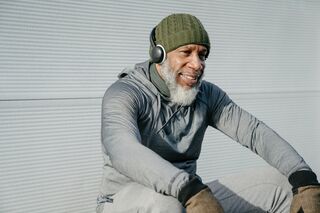Aging
Rethinking Old Age Can Improve Health
Research shows that ageism is bad for everyone, regardless of how old they are.
Posted November 22, 2021 Reviewed by Tyler Woods
Key points
- A new meta-analysis reveals that self-perceptions of aging forecast how people age in the future.
- Self-perceptions of aging pertains to how people see their own aging, which reveals social messages and stereotypes.
- People with optimistic, favorable views toward aging experience a longer lifespan, better wellness, and reduced odds of dementia over time.
- Stereotype Embodiment Theory may explain how stereotypes about aging could forecast lived experiences in aging.
If you’re open to it, try closing your eyes for just a moment and imagine what you would consider the typical person who has reached old age. What do they look like? How are they living? Are they active, healthy, capable, energetic, happy, and astute? Or are they inactive, sluggish, sickly, unhappy, tired, and inept? Now, regardless of what you envisioned, pause again and ask yourself one more question, no matter how old or young you are:
Could the image I just conjured up in my mind be relevant to my own aging?

According to a meta-analysis (an analysis of available research studies on a topic) published in November 2021, the answer to that question is “absolutely.”
A team of researchers analyzed 21 published studies that examined the relationship between what is referred to as “self-perceptions of aging” and how people age over time. What does “self-perceptions of aging” mean? As the researchers explained, this pertains to how an individual views their aging on the whole. Importantly, these perceptions signify socially transmitted messages and stereotypes that have been incorporated into that individual’s outlook toward aging.
The results revealed that how people aged 50 and older view their aging and the age-related impressions and stereotypes they adopt as their own forecast how they age later in a variety of ways. They found evidence that people who hold more upbeat notions of aging enjoy longer lives and a healthier, stronger body in the future. People with more favorable images about aging are also more likely to pursue a lifestyle that fosters wellness, such as exercising, staying away from smoking, and refraining from drinking too much. Moreover, individuals with a more optimistic view of aging are less likely to experience dementia; this also holds true for people with a particular gene that heightens their odds of dementia.
How does that work? Why would a person’s views on aging make a difference for their health, lifestyle, and wellness later on? The researchers drew from Stereotype Embodiment Theory to explain the connection. According to the original author of this theory (and the research team on the meta-analysis we’re talking about), there are four elements involved:
- People get exposed to stereotypes about aging, starting when they’re kids.
- These stereotypes aren’t necessarily conscious.
- As people grow up and continue to age, eventually they reach a point in life at which they become aware that they, themselves, are now an older person. At this point, those stereotypes become more noticeable and important, and they inform how that person sees themselves and their own aging.
- These views of aging (that are informed by stereotypes) impact people in three ways: Physiologically, psychologically, and behaviorally. Physiologically, unfavorable view of aging can lead to stronger reactions to stress. Psychologically, favorable views toward aging can cultivate affirming beliefs, whereas pessimistic views toward aging can generate adverse beliefs, and those beliefs can wind up becoming realized when people function in line with them. Behaviorally, people pursue lifestyles that are in line with their ideas and stereotypes about aging. For instance, if they believe that being healthy and strong in old age is entirely reasonable, then they’re more apt to take care of themselves than if they believe that being older always means being ill and feeble no matter what.
In considering these results, it's worth noting that this meta-analysis has some advantages. First, it pulled together studies that were conducted in five countries (the United States, Germany, Australia, Israel, and Switzerland). Although that means, as the research team rightly acknowledged, that it’s not possible to say their results hold all over the world, the research findings aren’t restricted to just one country. Second, the team only analyzed prospective, longitudinal studies, which means these studies measured people’s self-perceptions of aging and then followed them as time went by to examine the relationship between these perceptions and how they did later.
What can we take away from this vital research? As the research team correctly noted, these results suggest that what messages we take in and what we come to believe about aging is linked to our own vitality and how well we live as the years roll by, no matter how young or old we are right now. The researchers were also correct in calling for education to challenge false, negative stereotypes about aging and to promote images of older people that are more accurate and validating. Moreover, they also rightly suggested working with people who are in their middle years and beyond to help them learn about the value of favorable views toward aging, to acquire accurate education that counters cynical views, and to learn approaches that can advance personal wellness.
If your views of aging tend toward the less enthusiastic side, that’s okay. See if you can deliberately seek out counterexamples and actively question your views. Not only could it help you upgrade your outlook of aging, it might also allow you to expand what’s possible for yourself.
References
Levy, B. (2009). Stereotype embodiment: A psychosocial approach to aging. Current Directions in Psychological Science, 18, 332–336.
Tully-Wilson, C., Bojack, R., Millear, P. M., Stallman, H. M., Allen, A., & Mason, J. (2021). Self-perceptions of aging: A systematic review of longitudinal studies. Psychology and Aging, 36, 773-789.


